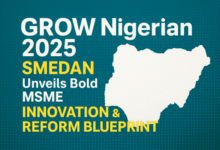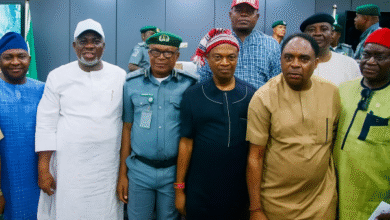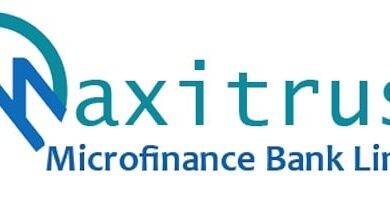NDIC Strengthens Legal Framework to Tackle Bank Failures and Enforce Accountability

Deepens Legal Power to Tackle Failed Banks
In a move set to redefine accountability and confidence in Nigeria’s financial system, the Nigeria Deposit Insurance Corporation (NDIC) has reaffirmed that its legal and institutional framework is now significantly stronger to prosecute individuals and entities responsible for bank failures.
With the enactment of the NDIC Act No. 30 of 2023 and the Banks and Other Financial Institutions Act (BOFIA) 2020, the corporation now wields enhanced powers to liquidate failed banks, recover assets, and pursue legal action against erring parties—marking a new era of enforcement in the country’s banking ecosystem.
Reform That Restores Confidence in the Financial System
According to Mr. Thompson Sunday, Managing Director and Chief Executive of NDIC, the new legal regime has “plugged historic loopholes” that allowed culpable directors and insiders of failed banks to evade prosecution or delay liquidation processes for years.
“Our laws are now more robust, comprehensive, and enforceable. The NDIC Act 2023 gives the Corporation greater autonomy to protect depositors, recover assets, and prosecute those responsible for bank failures,” Sunday said.
He commended the National Assembly for passing the landmark legislation, describing it as a transformative step toward strengthening financial stability, depositor protection, and institutional trust in Nigeria’s banking sector.
The NDIC boss also lauded the judiciary for its increasing proficiency in adjudicating financial and deposit insurance cases, noting that recent court decisions have demonstrated a strong grasp of the complexities of bank resolution, liquidation, and depositor claims.
“The judiciary’s evolving understanding of deposit insurance principles is fostering speedier justice and protecting public confidence in the regulatory system,” Sunday noted.
Heritage Bank Case: A Landmark Test of the New Law
One of the most striking examples of NDIC’s enhanced capability under the new law is the swift liquidation of the defunct Heritage Bank Limited, whose licence was revoked by the Central Bank of Nigeria (CBN) earlier this year.
Within just one year, NDIC successfully realized enough assets to declare a first round of liquidation dividends to uninsured depositors—an achievement the Managing Director credited to the institution’s reformed legal powers and operational flexibility.
“With stronger laws, asset recovery and liquidation timelines are now shorter, more transparent, and more impactful,” Sunday explained.
“We’re seeing responsible parties voluntarily seeking settlement to avoid further legal exposure—a sign that the system is now working as intended.”
New NDIC Mandate: Accountability, Transparency, and Deterrence
The strengthened NDIC Act introduces sweeping provisions that empower the corporation to:
- Investigate and prosecute individuals and institutions responsible for bank distress or failure.
- Recover assets of failed banks and distribute proceeds efficiently to depositors and creditors.
- Collaborate with law enforcement agencies and financial regulators to trace, freeze, and reclaim diverted or misappropriated funds.
- Impose penalties for non-compliance, insider abuse, or fraudulent financial practices that lead to systemic risks.
- Facilitate quicker depositor reimbursement, reducing the long wait times that previously eroded trust in the liquidation process.
The reforms not only enhance depositor confidence but also serve as a deterrent to financial mismanagement in Nigeria’s banking industry—ensuring that no individual or institution is above the law.
BRANDECONOMY INSIGHT: A Critical Milestone for Financial Stability
BRANDECONOMY’s analysis shows that the NDIC Act 2023 represents one of the most comprehensive legal upgrades in Nigeria’s banking regulation landscape since the 1990s banking crisis.
The reforms mark a transition from reactive liquidation to a proactive resolution framework, aligning Nigeria’s deposit insurance system with international best practices under the International Association of Deposit Insurers (IADI) standards.
The Act empowers NDIC not just to liquidate failed banks but to act as an early-warning institution, capable of intervening before a crisis spirals out of control.
“What we are witnessing is a recalibration of Nigeria’s financial safety net,” BRANDECONOMY notes.
“The NDIC’s ability to act swiftly, transparently, and legally in the aftermath of a bank failure sends a strong signal to investors, depositors, and bank directors alike — that prudence, governance, and compliance are now non-negotiable.”
Stronger Enforcement, Healthier Banking Sector
With over three decades of experience managing bank resolutions, NDIC has historically been constrained by legal and procedural bottlenecks. However, the 2023 legal reforms provide:
- Clarity of roles between the NDIC and CBN in bank resolution;
- Faster liquidation procedures to reduce losses to depositors;
- Enhanced collaboration with other financial safety institutions; and
- Greater legal protection for NDIC officials carrying out statutory duties.
These reforms are expected to deepen confidence in Nigeria’s financial system, boost investor sentiment, and strengthen deposit insurance coverage across commercial, microfinance, and mortgage banks.
Towards a More Secure Banking Future
The NDIC’s evolving legal powerbase represents a defining moment for Nigeria’s financial governance. By closing legal loopholes, enhancing accountability, and prioritizing depositor welfare, the corporation is positioning itself as a key player in Nigeria’s journey toward a resilient, transparent, and inclusive financial system.
As the NDIC continues to collaborate with the CBN, the judiciary, and the National Assembly, the era of impunity and delayed justice in the banking sector appears to be drawing to a close.
“No one should benefit from the collapse of a bank,” Sunday concluded.
“Our mandate is clear — protect depositors, uphold trust, and ensure justice in every resolution.”











